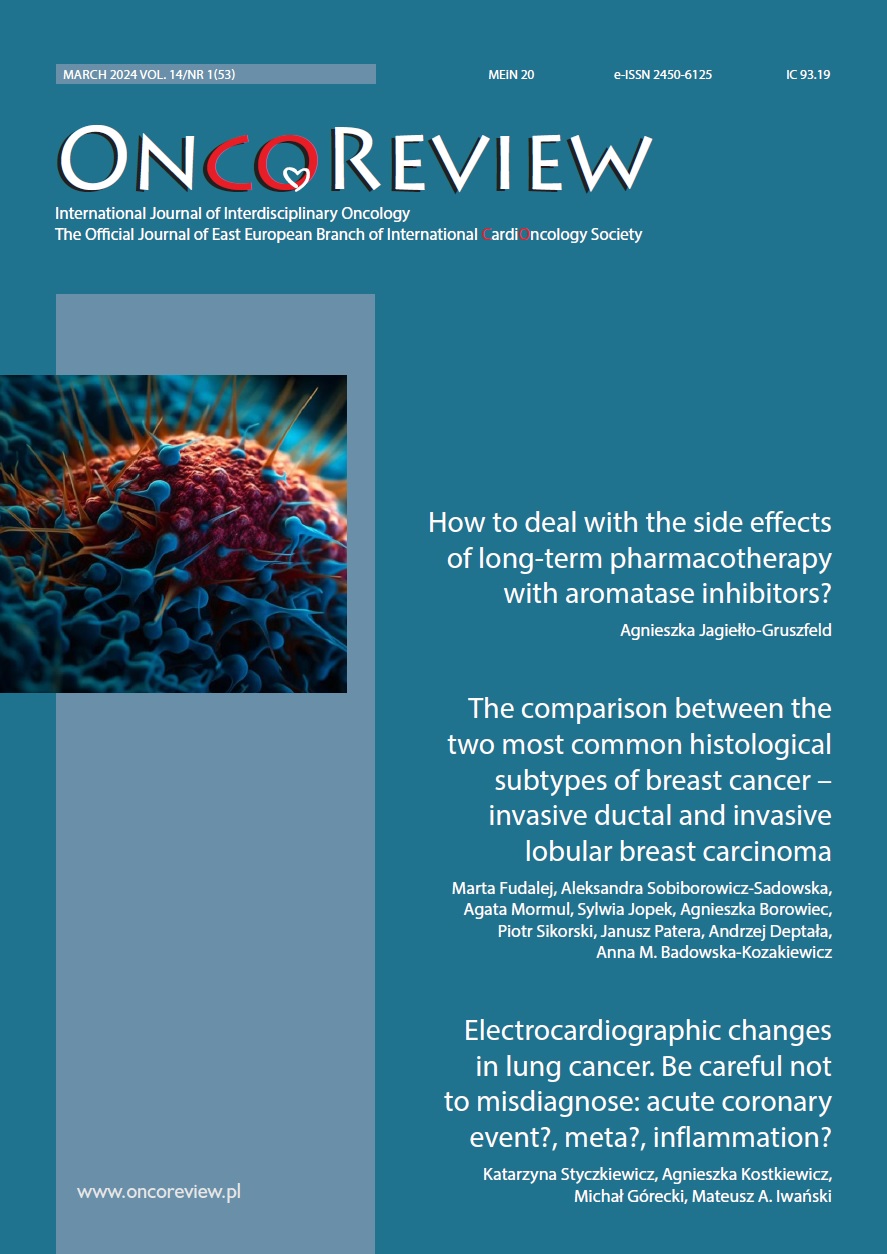How to deal with the side effects of long-term pharmacotherapy with aromatase inhibitors? Review article
Main Article Content
Abstract
Aromatase inhibitors are effective drugs used in adjuvant therapy of breast cancer. Their action is to reduce the level of oestrogens produced in adipose tissue in women in physiological or pharmacologically induced menopause. Nevertheless, long-term pharmacotherapy with aromatase inhibitors may lead to various side effects that may significantly affect the quality of life of patients. The following article presents the most common problems associated with aromatase inhibitor therapy and describes how to deal with these undesirable side effects.
Downloads
Metrics
Article Details

This work is licensed under a Creative Commons Attribution-NonCommercial 4.0 International License.
Copyright: © Medical Education sp. z o.o. This is an Open Access article distributed under the terms of the Attribution-NonCommercial 4.0 International (CC BY-NC 4.0). License (https://creativecommons.org/licenses/by-nc/4.0/), allowing third parties to copy and redistribute the material in any medium or format and to remix, transform, and build upon the material, provided the original work is properly cited and states its license.
Address reprint requests to: Medical Education, Marcin Kuźma (marcin.kuzma@mededu.pl)
References
2. Awan A, Esfahani K. Endocrine therapy for breast cancer in the primary care setting. Curr Oncol. 2018; 25(4): 285-91. http://doi.org/10.3747/co.25.4139.
3. Cucciniello L, Garufi G, Di Rienzo R et al. Estrogen deprivation effects of endocrine therapy in breast cancer patients: Incidence, management and outcome. Cancer Treat Rev. 2023; 120: 102624. http://doi.org/10.1016/j.ctrv.2023.102624.
4. Early Breast Cancer Trialists' Collaborative Group. Tamoxifen for early breast cancer. Cochrane Database Syst Rev. 2001; (1): CD000486. http://doi.org/10.1002/14651858.CD000486. Update in: Cochrane Database Syst Rev. 2008; (4): CD000486.
5. Chen S, Bo L, Lv D et al. Bone Safety Profile of Steroidal Aromatase Inhibitor in Comparison to Nonsteroidal Aromatase Inhibitors in Postmenopausal Women with Breast Cancer: A Network Meta-Analysis. Breast Care (Basel). 2022; 17(4): 391-402. http://doi.org/10.1159/000523695.
6. Symonds LK, Davidson NE. Are we there yet? Optimal duration of endocrine therapy in women with postmenopausal early-stage hormone receptor-positive breast cancer. J Natl Cancer Inst. 2023; 115(11): 1240-2. http://doi.org/10.1093/jnci/djad111.
7. Daly MB, Pal T, Maxwell KN et al. NCCN Guidelines® Insights: Genetic/Familial High-Risk Assessment: Breast, Ovarian, and Pancreatic, Version 2.2024. J Natl Compr Canc Netw. 2023; 21(10): 1000-10. http://doi.org/10.6004/jnccn.2023.0051.
8. Loibl S, André F, Bachelot T et al.; ESMO Guidelines Committee. Early breast cancer: ESMO Clinical Practice Guideline for diagnosis, treatment and follow-up. Ann Oncol. 2024; 35(2): 159-82. http://doi.org/10.1016/j.annonc.2023.11.016.
9. Gnant M, Fitzal F, Rinnerthaler G et al.; Austrian Breast and Colorectal Cancer Study Group. Duration of Adjuvant Aromatase-Inhibitor Therapy in Postmenopausal Breast Cancer. N Engl J Med. 2021; 385(5): 395-405. http://doi.org/10.1056/NEJMoa2104162.
10. Murphy CC, Bartholomew LK, Carpentier MY et al. Adherence to adjuvant hormonal therapy among breast cancer survivors in clinical practice: a systematic review. Breast Cancer Res Treat. 2012; 134(2): 459-78. http://doi.org/10.1007/s10549-012-2114-5.
11. Reinhorn D, Yerushalmi R, Moore A et al. Evolution in the risk of adverse events of adjuvant endocrine therapy in postmenopausal women with early-stage breast cancer. Breast Cancer Res Treat. 2020; 182(2): 259-66. http://doi.org/10.1007/s10549-020-05715-1.
12. Lello S, Paris I, Cagnacci A et al. Vasomotor symptoms and management of women undergoing treatment for breast cancer: literature review with focus on the therapeutic potential of cytoplasmic pollen extract. Gynecol Endocrinol. 2023; 39(1): 2162035. http://doi.org/10.1080/09513590.2022.2162035.
13. Shams T, Firwana B, Habib F et al. SSRIs for hot flashes: a systematic review and meta-analysis of randomized trials. J Gen Intern Med. 2014; 29(1): 204-13. http://doi.org/10.1007/s11606-013-2535-9.
14. Hyder T, Marino CC, Ahmad S et al. Aromatase Inhibitor-Associated Musculoskeletal Syndrome: Understanding Mechanisms and Management. Front Endocrinol (Lausanne). 2021; 12: 713700. http://doi.org/10.3389/fendo.2021.713700.
15. Henry NL, Unger JM, Schott AF et al. Randomized, Multicenter, Placebo-Controlled Clinical Trial of Duloxetine Versus Placebo for Aromatase Inhibitor-Associated Arthralgias in Early-Stage Breast Cancer: SWOG S1202. J Clin Oncol. 2018; 36(4): 326-32. http://doi.org/10.1200/JCO.2017.74.6651.
16. Niravath P, Hilsenbeck SG, Wang T et al. Randomized controlled trial of high-dose versus standard-dose vitamin D3 for prevention of aromatase inhibitor-induced arthralgia. Breast Cancer Res Treat. 2019; 177(2): 427-35. http://doi.org/10.1007/s10549-019-05319-4.
17. Greenlee H, Crew KD, Shao T et al. Phase II study of glucosamine with chondroitin on aromatase inhibitor-associated joint symptoms in women with breast cancer. Support Care Cancer. 2013; 21(4): 1077-87. http://doi.org/10.1007/s00520-012-1628-z.
18. Alhanafy AM, Labeeb A, Khalil A. The Role of Diuretics in Treatment of Aromatase Inhibitors Induced Musculoskeletal Symptoms in Women with Non-Metastatic Breast Cancer. Asian Pac J Cancer Prev. 2018; 19(12): 3525-31. http://doi.org/10.31557/APJCP.2018.19.12.3525.
19. Lambert LK, Balneaves LG, Howard AF et al. Patient-reported factors associated with adherence to adjuvant endocrine therapy after breast cancer: an integrative review. Breast Cancer Res Treat. 2018; 167(3): 615-33. http://doi.org/10.1007/s10549-017-4561-5.
20. Cho AR, Choi WJ, Kwon YJ et al. Mediterranean Diet and Naltrexone/Bupropion Treatment for Weight Loss in Overweight and Obese Breast Cancer Survivors and Non-Cancer Participants: A Pilot Randomized Controlled Trial. Diabetes Metab Syndr Obes. 2020; 13: 3325-35. http://doi.org/10.2147/DMSO.S269237.
21. Wang L, Deng Y. The applications of androgen in the treatment of dry eye disease: a systematic review of clinical studies. Endocr J. 2020; 67(9): 893-902. http://doi.org/10.1507/endocrj.EJ20-0178.
22. Hershman DL, Unger JM, Greenlee H et al. Comparison of Acupuncture vs Sham Acupuncture or Waiting List Control in the Treatment of Aromatase Inhibitor-Related Joint Pain: A Randomized Clinical Trial. JAMA Netw Open. 2022; 5(11): e2241720. http://doi.org/10.1001/jamanetworkopen.2022.41720.
23. Freites-Martinez A, Shapiro J, Chan D et al. Endocrine Therapy-Induced Alopecia in Patients with Breast Cancer. JAMA Dermatol. 2018; 154(6): 670-5. http://doi.org/10.1001/jamadermatol.2018.0454.
24. Moskalewicz A, Di Tomaso A, Kachura JJ et al. Gynecologic Symptoms among Hormone Receptor-Positive Breast Cancer Patients on Oral Endocrine Therapy: A Cross-Sectional Study. Curr Oncol. 2022; 29(3): 1813-27. http://doi.org/10.3390/curroncol29030149.
25. Coleman R, Hadji P, Body JJ et al.; ESMO Guidelines Committee. Bone health in cancer: ESMO Clinical Practice Guidelines. Ann Oncol. 2020; 31(12): 1650-63. http://doi.org/10.1016/j.annonc.2020.07.019.

